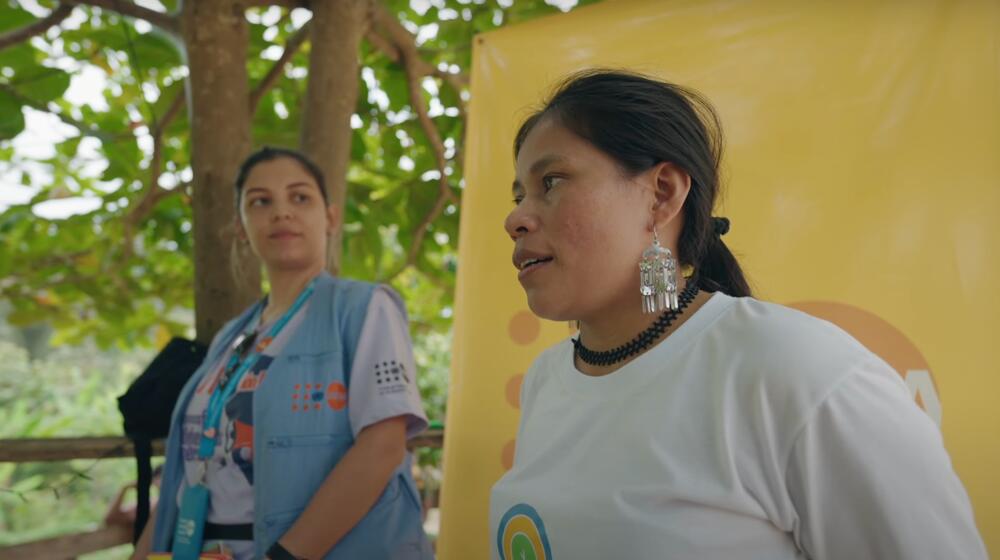News
“A fight against oblivion”: How Colombia empowers communities to combat conflict-related sexual violence
- 20 June 2023
News
UNITED NATIONS, New York – “There are many women who have been raped, mistreated by armed actors or by society itself,” said Pastora, an indigenous woman from the Nasa community in Colombia.
With the winding down of Colombia’s decades-long internal conflict, nearly 24,000 people have shared testimony with a national Truth Commission on the atrocities they had survived. Pastora was one of them – and her story, like many others published in the Commission’s 2022 report, sheds light on the disproportionate costs of the country’s conflict for women and girls.
Around the world, women and girls face particular threats when armed confrontations spark and crisis strikes. One is sexual violence, long used by combatants as a weapon of war and a means to spread fear and exert control.
In Colombia, sexual violence was a “habitual, widespread, systematic and invisible practice” perpetrated throughout decades of clashes. And unfortunately, despite recent progress towards peace and national reconciliation, these crimes have continued against the backdrop of lingering fighting.
Since a landmark peace deal was signed in 2016, more than 1,500 people have reported experiencing conflict-related sexual violence – the vast majority of them women.
“Sexual violence destroys lives and violates human rights. It must not be ‘normalized’ as something that is destined to happen, something that cannot be stopped,” said UNFPA Executive Director Dr. Natalia Kanem.
“We must work together to end this horror, not allow it to endlessly repeat.”
Stopping the cycle
Globally, UNFPA advocates for the complete elimination of all forms of gender-based violence, including sexual violence in conflict. In Colombia, the agency also sends mobile response teams to parts of the country affected by conflict and crisis to provide women and girls sexual and reproductive health services and gender-based violence case management and awareness training.
“The guiding principles for UNFPA within its operations ensure needs-based care for survivors aimed at creating a supportive environment where the rights of the person who has experienced gender-based violence are respected,” said Lucía Gallego, Chocó local coordinator for UNFPA Colombia.
“With all of this we involve indigenous and women leaders of African descent, who play a role in promoting rights and establishing support networks in the communities, in addition to referring and accompanying women who require services.”
Afrodescendent women, as well as indigenous women like Pastora, have been disproportionately targeted throughout Colombia’s years of conflict and subjected to displacement and abuse.
In 2022, of nearly 400 forcibly displaced women who reported surviving crimes against their sexual freedom and integrity, 6 per cent belonged to indigenous groups and 30 per cent were of African descent.
Unfortunately, due to a variety of factors, these crimes often go “unreported and unpunished”, according to Dr. Kanem.
“Many who become victims find it difficult to access help as conflict and insecurity break down health and justice systems. Many will be too afraid or ashamed to seek care,” she said.
A community approach
Addressing these challenges requires empowering individuals affected by conflict-related sexual violence to see it for what it is – a crime – and fortifying pathways to support and justice.

Carmencita Chami, indigenous leader of the Embera Dobida ethnic group based in the Colombian Pacific region, has worked with UNFPA as a community liaison on issues of gender-based violence. She says the collaboration has invigorated her to support others.
“I know that in some women, this idea has remained: That women do have rights. And they already know where to go when such conflict situations occur,” she said.
Ms. Chami’s work lines up with that of dozens of other groups, which aim to alleviate the consequences of armed conflict that especially affect the women and girls of the world – something societies across the globe cannot turn a blind eye to.
As Pastora said in her testimony to Colombia’s Truth Commission: "This is a fight against oblivion".